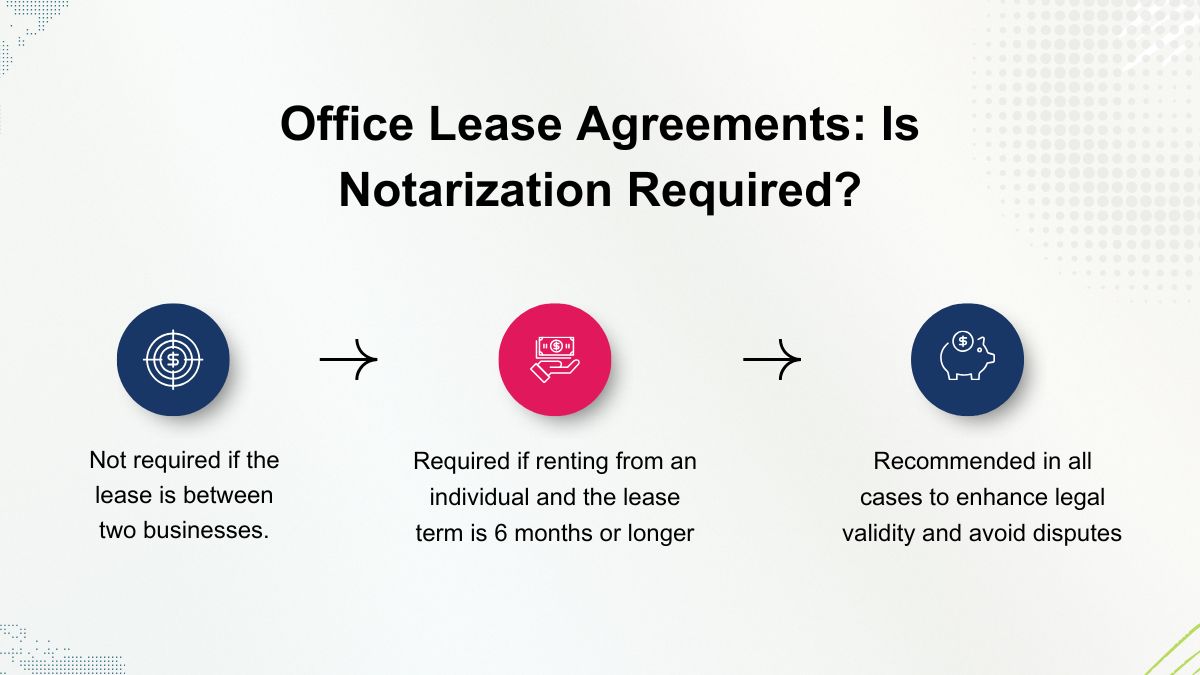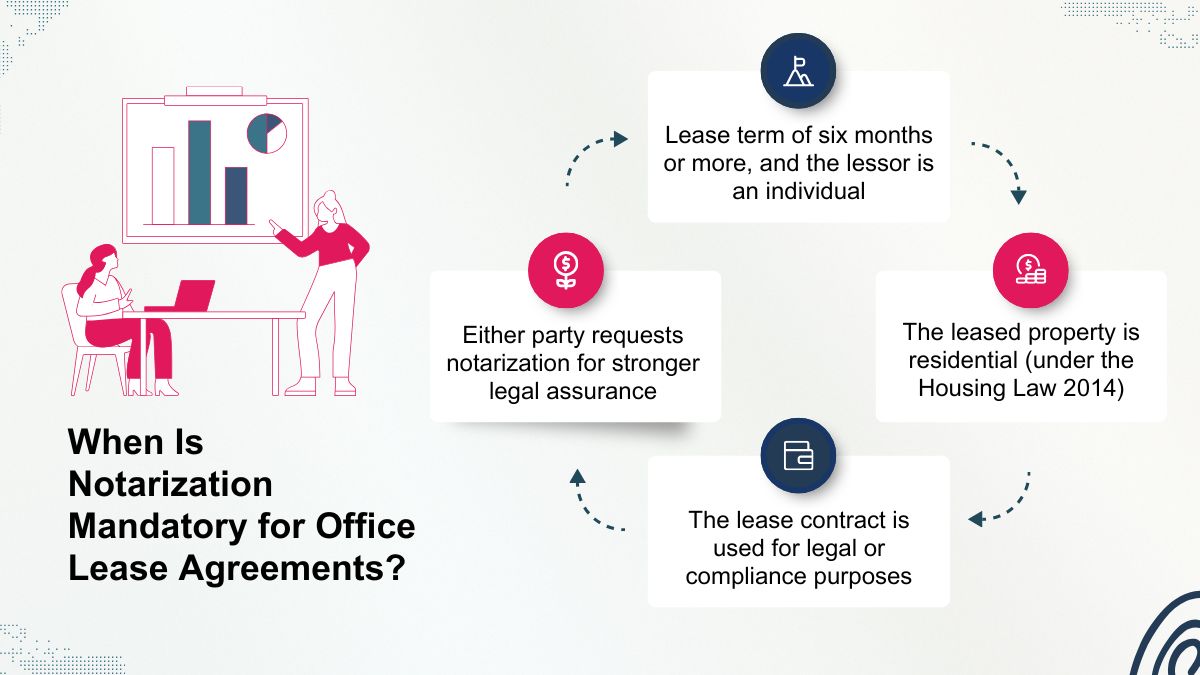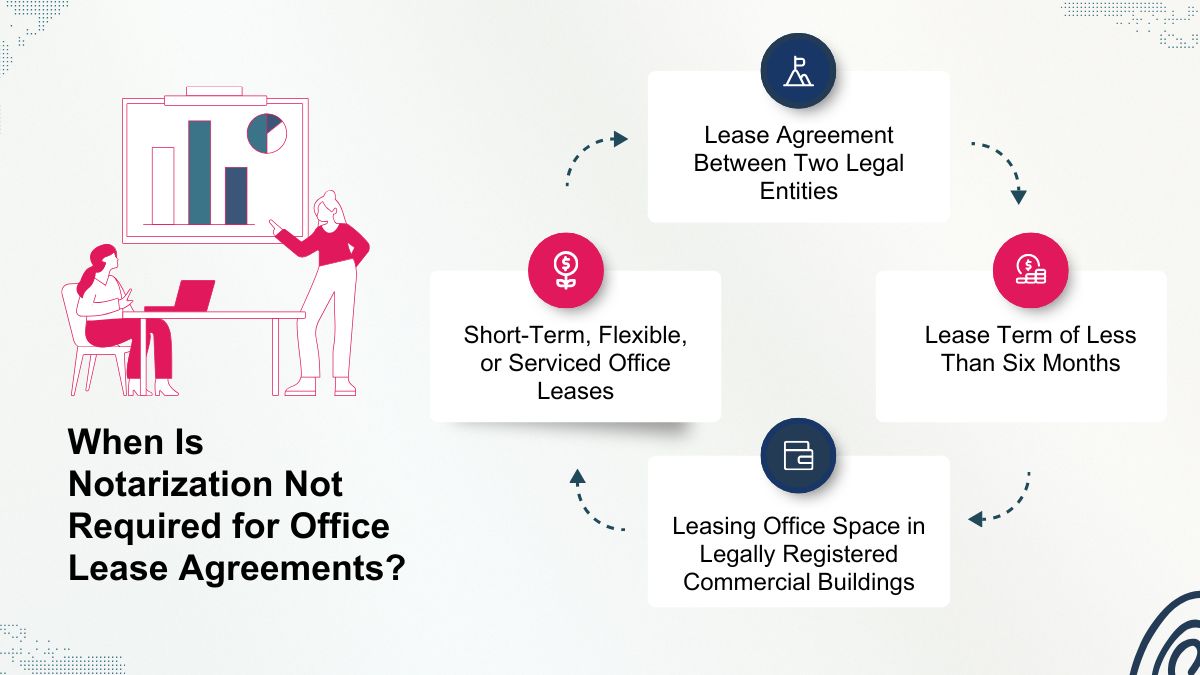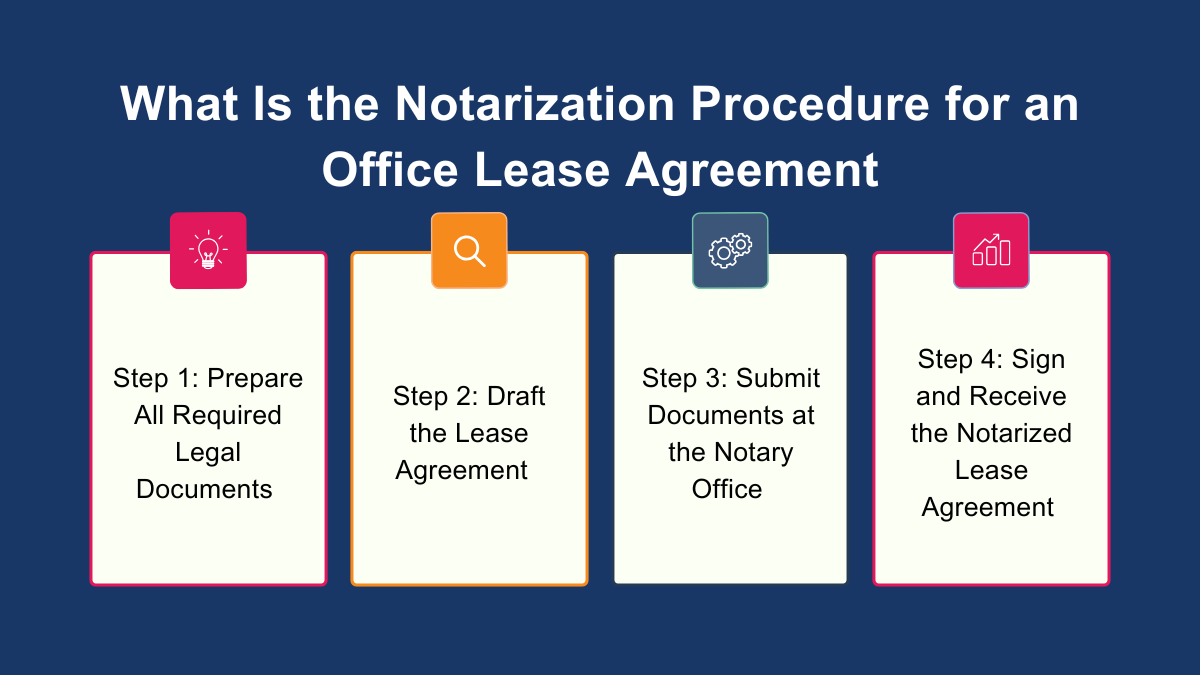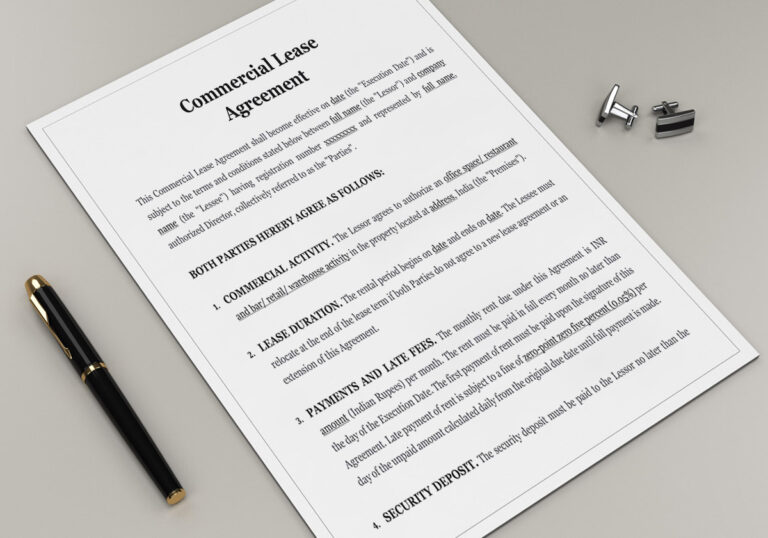Is Notarization Required for an Office Lease Agreement?

When signing an office lease agreement, many businesses remain uncertain whether notarization is a mandatory legal requirement or simply a recommended procedure. In fact, current Vietnamese law provides different guidelines depending on the parties involved, the lease term, and the type of property. This article will clarify when office lease contracts must be notarized and when they are exempt – helping you avoid legal risks and ensure the enforceability of your lease agreement.
Table of Contents
- 1. Is Notarization Required for Office Lease Agreements?
- 2. Legal Regulations on Notarization of Office Lease Agreements
- 3. When Is Notarization Mandatory for Office Lease Agreements?
- 4. When Is Notarization Not Required for Office Lease Agreements?
- 5. What Is the Notarization Procedure for an Office Lease Agreement?
- 6. Legal Risks of Not Notarizing an Office Lease Agreement
- 7. Frequently Asked Questions (FAQs)
- 7.1 Is notarization required when leasing from an individual?
- 7.2 How much does it cost to notarize an office lease agreement?
- 7.3 Will an office lease agreement be invalid without notarization?
- 7.4 Can office lease agreements be notarized online?
- 7.5 Is notarization required for serviced office leases?
1. Is Notarization Required for Office Lease Agreements?
Notarizing an office lease agreement is not always mandatory. It depends on several factors, including the contracting parties, the intended use of the property, the lease duration, and the type of asset being leased.
According to the 2015 Civil Code of Vietnam, lease agreements – including those for housing or office space – generally do not require notarization unless specifically mandated by law. In most cases, the parties may enter into a written agreement without notarization.
However, notarization becomes mandatory in certain situations, particularly when:
- The lease term is six months or longer
- The lessor is an individual or household
- The leased property is a residential unit (as governed by the Housing Law 2014)
- The lease agreement must be submitted to a state agency (e.g., the Department of Planning and Investment) for business registration purposes
Conversely, when leasing office space from licensed real estate businesses or commercial building developers, notarization is usually not required, as the legal status of the property is already established and the lease contract is signed and sealed by authorized legal entities.
2. Legal Regulations on Notarization of Office Lease Agreements
Whether an office lease agreement requires notarization must be assessed based on current legal provisions. Three key legal frameworks govern this matter:
2.1 Civil Code 2005 and 2015
According to Article 492 of the 2005 Civil Code, lease agreements for residential property with a term of six months or more must be made in writing and notarized or certified.
However, this provision was revised in the 2015 Civil Code, providing greater flexibility:
“A lease contract shall be established based on the parties’ agreement and is not required to be notarized, unless otherwise provided by law.”
This allows the involved parties to decide the contract form themselves – except where a specific sectoral law imposes mandatory notarization.
2.2 Housing Law 2014 (Articles 122 & 124)
Article 122 stipulates that a residential lease agreement must be made in writing, including in cases where the property is used as an office.
Article 124 further provides that if one party is an individual and the lease term is six months or more, the contract must be notarized or certified, unless otherwise agreed by the parties or governed by another specific law.
Important Note: If a business leases a residential property from an individual (not a real estate company) to use as its registered office, notarization is required to legalize the company address for business registration purposes.
2.3 Law on Notarization 2014 (Articles 4 & 42)
Article 4 affirms that notarization is the act of a notary public certifying the legality of civil contracts and transactions, ensuring they do not violate the law or social ethics.
Article 42 stipulates that notarization of house lease contracts (categorized under real estate transactions) must be performed at licensed notarial practice organizations.
This highlights that when an office lease agreement falls under a case requiring notarization, the notary is responsible for reviewing all legal documents, including ownership certificates and the full contents of the contract, to ensure its compliance with legal regulations.
3. When Is Notarization Mandatory for Office Lease Agreements?
Not all office lease agreements require notarization. However, according to the Housing Law 2014, the Civil Code 2015, and practical application, the following cases must be notarized to ensure legal enforceability:
3.1 Lease term of six months or more, and the lessor is an individual
When the lease duration is six months or longer and the landlord is not a legal entity (i.e., an individual or household), notarization is mandatory to ensure the contract’s enforceability.
Without notarization, the agreement may be declared invalid in form by the court in the event of a dispute.
3.2 The leased property is residential (under the Housing Law 2014)
Even if used as an office, leasing a residential property owned by an individual or household is still governed by the Housing Law, which requires the contract to be notarized.
3.3 The lease contract is used for legal or compliance purposes
Some authorities — such as the Department of Planning and Investment, banks, or audit partners — may require a notarized lease agreement to validate the legal company address or the tenant’s legal standing.
3.4 Either party requests notarization for stronger legal assurance
Even when not legally required, either party – especially corporate tenants or professional landlords – may request notarization to formalize the agreement and minimize potential legal risks.
4. When Is Notarization Not Required for Office Lease Agreements?
Although an office lease agreement is an important legal document, not all cases require notarization. According to current regulations, the following common scenarios do not mandate notarization:
4.1 Lease Agreement Between Two Legal Entities (Business-to-Business)
When both the landlord and the tenant are legal entities (registered businesses with company seals), the lease agreement is legally valid with signatures and company stamps only.
This is the most common structure in Grade A and Grade B commercial office buildings, where landlords or property managers are licensed real estate companies.
4.2 Lease Term of Less Than Six Months
According to the Housing Law 2014, lease agreements with a term of less than six months do not require notarization, even if the landlord is an individual.
However, it is still advisable to draft a written agreement with both parties’ signatures as legal proof in case of disputes.
4.3 Leasing Office Space in Legally Registered Commercial Buildings
In professionally managed buildings (by reputable developers or property management firms), standardized lease agreements are often provided. In such cases, notarization is not required, as the legal framework is already well established.
The agreement becomes legally effective when it includes all key elements: company details, leased area, term, rental fees, and valid signatures and stamps from both parties.
4.4 Short-Term, Flexible, or Serviced Office Leases
For coworking spaces, shared offices, or serviced office models, lease contracts are typically not notarized due to their short-term nature, fixed pricing, and flexible terms.
Note: Even when notarization is not required, businesses should always ensure that the lease agreement is in writing, with complete information, clearly defined terms, and signatures from authorized representatives to avoid future legal disputes.
5. What Is the Notarization Procedure for an Office Lease Agreement?
To ensure the legal enforceability of an office lease agreement in cases where notarization is required, both parties must complete the notarization process at a licensed public or private notary office. Below is a step-by-step overview and a list of the required documents:
Step 1: Prepare All Required Legal Documents
From the landlord (lessor):
- Certificate of land use rights and property ownership (Pink Book/Red Book)
- Personal ID: Citizen ID/passport and household registration (if individual)
- Business license and power of attorney for the signatory (if a legal entity)
From the tenant (lessee):
- Citizen ID/passport of the legal representative
- Business registration certificate (if the tenant is a company)
- Power of attorney or appointment decision of the signatory
Step 2: Draft the Lease Agreement
The lease agreement can be drafted by either party or with the assistance of the notary office.
Key elements of the lease should include:
- Description of the leased property (address, size, intended use)
- Lease term
- Rental price and payment method
- Rights and obligations of both parties
- Termination conditions and dispute resolution terms
–> Maison Office can provide legally compliant lease templates tailored to asset types and parties involved.
Step 3: Submit Documents at the Notary Office
- Both parties (or authorized representatives) must visit a notary office near the leased property.
- The notary will verify the documentation and assess the legality of the transaction.
- If all documents are valid, notarization is typically completed within 1–3 working days.
Step 4: Sign and Receive the Notarized Lease Agreement
- Both parties sign the lease agreement in the presence of the notary.
- The notary returns the original and notarized copies with official seals.
- Multiple notarized copies can be requested for use with relevant institutions (e.g., banks, DPI, auditors).
Notarization Fees for Office Lease Agreements
- Fees are calculated as a percentage of the contract value:
- Under VND 50 million: approx. VND 50,000 – 100,000
- VND 50 million – 100 million: 0.1% – 0.3% of contract value
- Above VND 100 million: based on the official Notarization Fee Schedule
Additional fees may apply for photocopying, certified copies, and file storage (typically VND 100,000 – 300,000, depending on the notary office).
6. Legal Risks of Not Notarizing an Office Lease Agreement
Failing to notarize an office lease agreement in cases where it is legally required can lead to serious legal consequences – directly affecting the tenant’s rights and interests, especially for businesses.
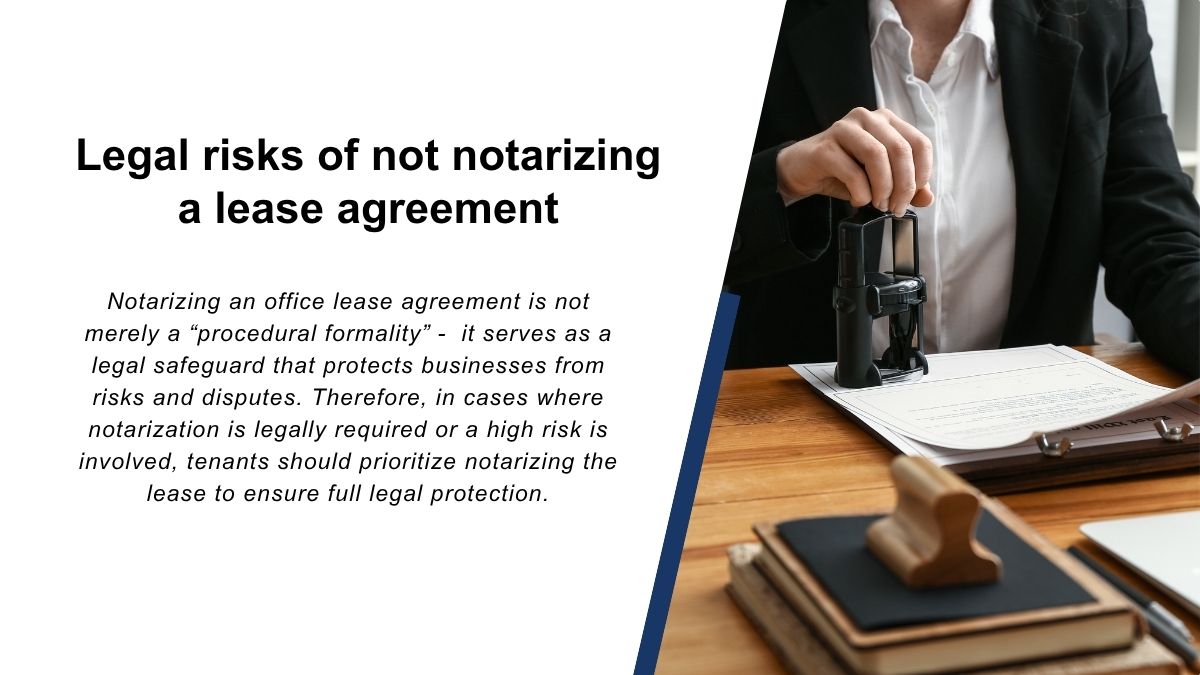
6.1 The Lease May Be Declared Legally Invalid
- Courts may rule the lease null and void due to improper legal form.
- All contractual terms and obligations become unenforceable.
- The tenant loses the right to negotiate or claim compensation in case of disputes.
6.2 Inability to Register Business Address
- The Business Registration Office may reject the lease if it is not notarized.
- This affects company incorporation, bank account opening, and applying for business licenses.
- Can cause delays in launching business operations.
6.3 Limited Legal Protection in Disputes
- No official legal evidence regarding lease term, rental price, or agreed conditions.
- The contract may not be recognized as valid evidence in court or by government agencies.
- Increases the risk of sudden termination and forced eviction by the landlord.
6.4 Not Accepted in Other Legal Transactions
- Cannot be used as collateral in bank loan applications.
- Not recognized as a legitimate expense during tax finalization.
- Not accepted in audits, mergers, acquisitions, or internal reviews.
7. Frequently Asked Questions (FAQs)
7.1 Is notarization required when leasing from an individual?
Yes. If the landlord is an individual and the lease term is six months or longer, notarization is mandatory under the Housing Law 2014 to ensure legal enforceability.
7.2 How much does it cost to notarize an office lease agreement?
Notarization fees typically range from 0.1% to 0.3% of the contract value, plus administrative costs (certified copies, file storage, etc.). For a lease valued at VND 500 million, the notarization fee may range from VND 500,000 to 1,500,000.
7.3 Will an office lease agreement be invalid without notarization?
Possibly. If the lease falls under a category that requires notarization and the parties fail to comply, the contract may be declared invalid due to formality issues in the event of a legal dispute.
7.4 Can office lease agreements be notarized online?
Currently, Vietnam does not allow remote or fully online notarization. Both parties must be physically present at the notary office to sign and verify the agreement.
7.5 Is notarization required for serviced office leases?
Generally, no. Flexible leasing models such as serviced offices, coworking spaces, or short-term agreements under six months do not require notarization, unless the address is used for business registration. However, a clear written contract is still necessary.

Editor and content team manager at Maison Office.
With over 5 years of experience in consulting and extensive content editing in the real estate services and interior design field. Sharing valuable information with customers, partners, and attracting millions of views.

